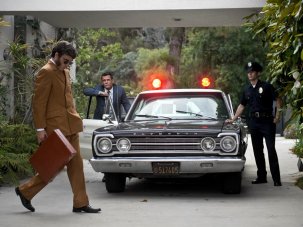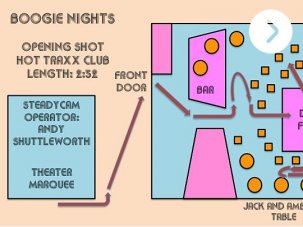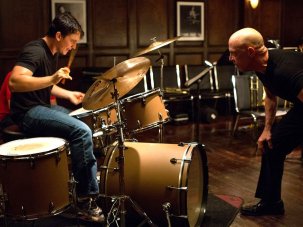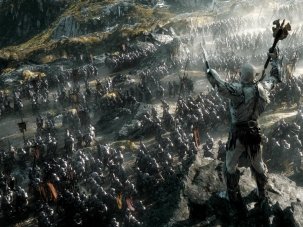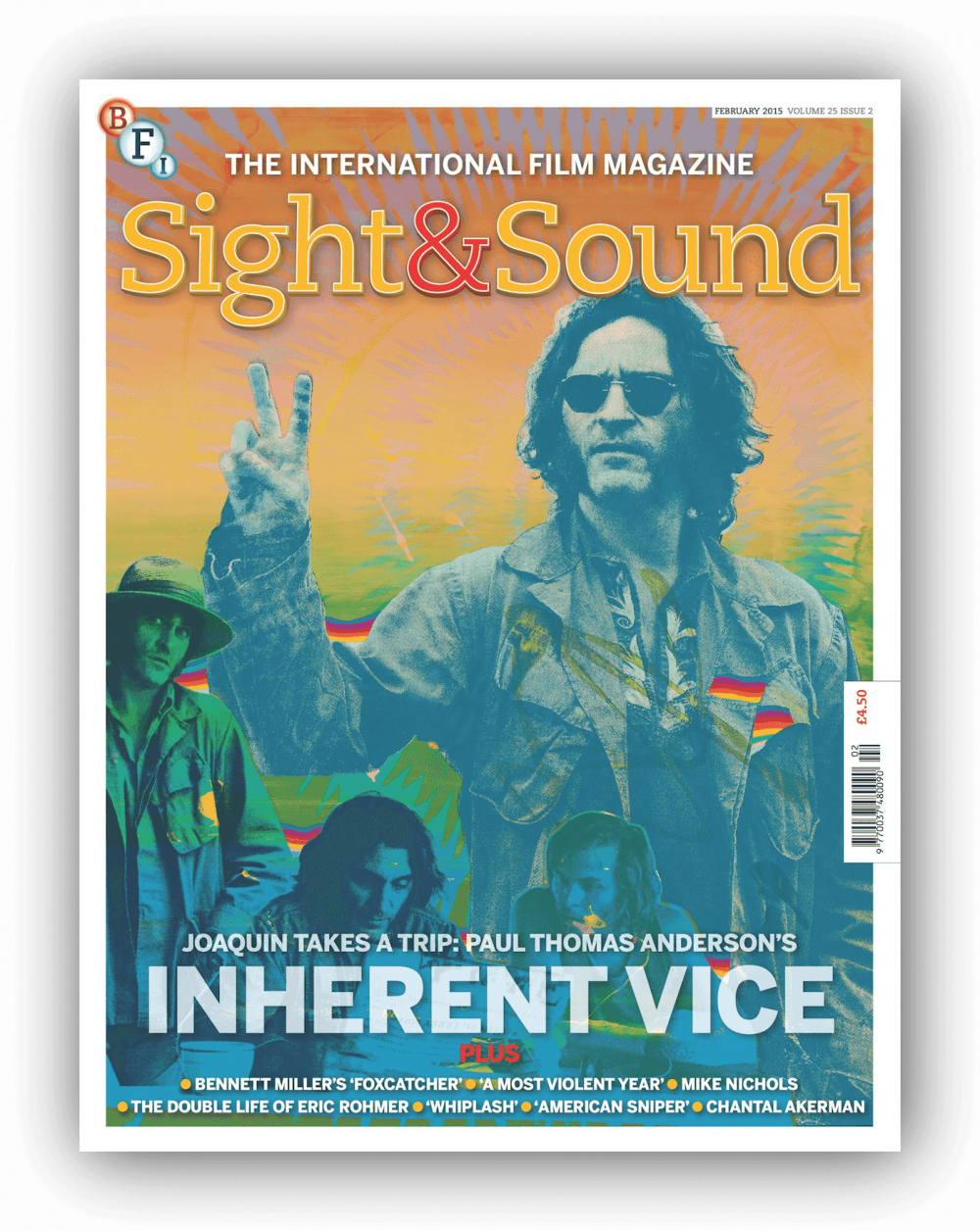
After the 1970s LA porn industry, the late 19th-century South Californian oil boom and an itinerant post-war cult resembling Scientology, to name just a few Andersonian worlds, what facet of American frontier life would Paul Thomas Anderson turn to next?
Posted to subscribers and available digitally 2 January
→
→ Sign up / log in
On UK newsstands 6 January
The latest from one of the most ambitious (his detractors say highfalutin) and formally inventive directors working today turns out to be an adaptation of Thomas Pynchon’s hippie-sleuth thriller Inherent Vice, set in a psychedelic 70s Los Angeles numbed and soured in the wake of the Manson killings. Joaquin Phoenix stars as a stoner private eye stumbling through numerous cases and getting entangled with the law after waking up next to a corpse in a massage parlour. Jonathan Romney tunes in to this rather un-Anderson “free-associative jam session, a succession of eccentric solos and spiky duets”, and talks to the filmmaker about, amongst other things, the influence of Neil Young, the talents of Pynchon, the appeal of 60s Playboy and why crane shots are a terrible waste of money, time and film.
A handful of other American filmmakers dominate our feature line-up this month:
- the veteran chronicler of institutions Frederick Wiseman, who looks back over his 45-year documentary career in a long interview with David Jenkins;
- the late Mike Nichols, whose versatile talents are remembered by David Thomson;
- Bennett Miller, who discusses Foxcatcher, his dramatisation of the true story of disturbed millionaire John du Pont who took in two down-on-their-luck Olympic wrestler brothers – a gothic tale about wealth, class and power that takes aim at the heart of the American psyche.
They are joined by two emerging American voices:
- Damien Chazelle, who details the making of his second feature, the blistering ‘fast movie’ Whiplash, about the struggles of a young would-be jazz drummer;
- and J.C. Chandor, whose A Most Violent Year is a tense drama about (would you believe it?) heating-oil deliveries, serving up far more than references to all its famous NY-set gangster predecessors, bearing more similarities with Gandhi than Goodfellas.
Meanwhile, on the eve of a comprehensive Eric Rohmer retrospective at London’s BFI Southbank, Geoff Andrew explores the life of the oldest leading light of the nouvelle vague, examining the remarkable and remarkably private man behind such classics as The Green Ray and My Night with Maud.
It was after watching Pierrot le fou (1965) by Rohmer’s New Wave compatriot Jean-Luc Godard that Chantal Akerman decided, aged 15, that her vocation was to be a filmmaker. Cristina Alvarez López and Adrian Martin pay tribute to the Belgium director’s restless experimentation with both fact and fiction, selecting highlights from her long career.
Our comprehensive reviews pages include in-depth looks at Claude Lanzmann’s The Last of the Unjust, novelist Alex Garland’s first foray into directing, the sci-fi thriller Ex Machina, Clint Eastwood’s American Sniper and much more.
Meanwhile our Home Cinema pages review a new collection of Les Blank’s films and a release of D.W. Griffith’s Intolerance, while Kim Morgan wonders, in our regular Lost and Found column, why Russell Rouse’s B-movie noir Wicked Woman, featuring a mesmerising Beverly Michaels, isn’t yet available on DVD.
-
Sight & Sound is now available in digital editions for Apple iOS, Android and Kindle Fire as well as computer desktops. Scroll this gallery to browse this issue’s sections.
-
RUSHES: The joys of women in silent comedy, five key teacher-pupil films, Pelo malo’s director Mariana Rondón, Hannah McGill goes bananas and Mark Cousins squares up to François Truffaut, the young critic.
-
THE INDUSTRY: the making of Into the Woods, the UK box office in 2014 and investing in the audiences of the future. Plus a Festivals report from Amsterdam’s International Documentary Festival.
-
COVER FEATURE: In Paul Thomas Anderson’s adaptation of Thomas Pynchon’s Inherent Vice, Joaquin Phoenix plays a stoner detective in a California hippie culture soured after the Manson murders. Jonathan Romney tunes in to the film and talks to the director.
-
Whiplash follows the battles between a young would-be jazz drummer and his sadistic music teacher. Nick James takes five perspectives on the film and talks to director Damien Chazelle.
-
The pseudonym adopted by Maurice Henri Joseph Schérer was just one of the ways the director ensured his public and private lives were strictly separated. By Geoff Andrew.
-
Bennett Miller’s true-life tale Foxcatcher is a troubling examination of class and male pride in America. By Sam Davies.
-
The late director joins a formidable list of professional filmmakers celebrated for their versatility. By David Thomson.
-
J.C. Chandor’s A Most Violent Year is far more than a generic gangster picture. By Trevor Johnston.
-
As National Gallery is released, the veteran documentary filmmaker explains the golden rule of filming. By David Jenkins.
-
WIDE ANGLE: A Chantal Akerman primer, Louis and Bebe Barron’s groundbreaking score for Forbidden Planet, rediscovering a lost fragment of early cinema – Cheese Mites.
-
REVIEWS: American Sniper, Ex Machina, The Last of the Unjust and 36 more new releases reviewed.
-
HOME CINEMA: the joyous films of Les Blank, D.W. Griffith’s unapologetic Intolerance, Wicked Woman + 14 more releases reviewed.
-
BOOKS: eating Werner Herzog’s words, the BFI Film Classic on Quatermass and the Pit, a reappraisal of Tod Browning’s Dracula and a new collection of essays devoted to Eric Rohmer.
-
ENDINGS: Trevor Johnston on Michael Curtiz’s The Breaking Point.
Features
Cover feature: Strange daze
Paul Thomas Anderson’s Inherent Vice, a freewheeling adaptation of Thomas Pynchon’s picaresque novel, sees Joaquin Phoenix play a stoner detective against the backdrop of a Californian hippie culture soured in the wake of the Manson killings. By Jonathan Romney.
Slave to the rhythm
Whiplash is a film about the struggles of a young would-be jazz drummer that took Sundance, and then Cannes, by storm. Nick James takes five perspectives on the film and, overleaf, talks to its fresh-faced director Damien Chazelle.
The double life of Eric Rohmer
The pseudonym adopted by the intensely private family man Maurice Henri Joseph Schérer was more than simply a name – it was a way to help him compartmentalise the very different sides of his life, an enigmatic duality he explored in semi-autobiographical fashion in his films. By Geoff Andrew.
Wrestling with demons
Bennett Miller’s Foxcatcher, which tells the fateful true-life tale of a disturbed millionaire who takes over the training of a pair of down-on-their-luck Olympic wrestlers, is a troubling examination of the fiercely contested battlegrounds of class and male pride in America. By Sam Davies.
Mike Nichols on assignment
The director, who died in November aged 83, may not have made films with the distinctive personality of a true auteur, but he joins a formidable list of professional filmmakers alongside Vincente Minnelli and Stephen Frears who are celebrated precisely because of their versatility. By David Thomson.
Oil city confidential
J.C. Chandor’s follow-up to All Is Lost might fit the template of the generic gangster picture in its tale of a Colombian ex-pat trying to make it in America, but there’s rather more Gandhi and less Goodfellas than you might expect in a movie called A Most Violent Year. By Trevor Johnston.
The S&S Interview: Frederick Wiseman
For National Gallery, the veteran documentary filmmaker spent 12 weeks shooting 170 hours of footage to create an exhaustive portrait of one of the world’s top art galleries, investigating the work of everyone from framers and restorers to curators and administrators. He explains to David Jenkins why the golden rule of filming is always to be aware that the killer moment is likely to happen the second you put down your camera.
Regulars
Editorial
Mid-budget woes and wishful thinking.
Rushes
In the frame: Queens of comedy
Some of the funniest comics of the silent era were women –including some stars you might not think of as funny at all. By Lucy Porter.
Object lesson: Forbidden fruit
As well as being sexually suggestive, the use of bananas in cinema taps in to a long history of racist imagery. By Hannah McGill.
The five key…: Teacher-pupil films
As Whiplash hits UK cinemas, we go back to the classroom for five films focusing on the relationship between teachers and their charges. By Alice Butler.
First sight: Rondon calling
For director Mariana Rondón, the story of a boy who wants straighter hair was a way of depicting the violence in Venezuelan society. By Mar Diestro-Dópido.
Dispatches: Journey into fear
François Truffaut’s work as a critic helped fuel my love of film, so I decided it was time to dig out his first ever review and compare notes. By Mark Cousins.
The industry
Development tale: Into the Woods
It needed trimming, Disneyfication and changes in Hollywood fashion to get Sondheim’s sophisticated take on fairytales to the screen. By Charles Gant.
The numbers: 2014 in review
Brewster: If you build it…
If we want a thriving exhibition landscape in a generation’s time, we need investment to establish a younger, more diverse audience. By Ben Roberts.
Profile: The educators
With the London Film School’s move to a new site imminent, its director Jane Roscoe looks forward to a new chapter in its history. By Geoffrey Macnab.
Festivals
IDFA: Life in the balance
Entries on the trauma of war and life on the margins of Russian society won awards, while a symposium assessed the status of women in film. By Nick Bradshaw.
Wide angle
Chantal Akerman: A primer
Throughout her career, the director has pursued certain themes and ideas. Here, we offer a guide to some of the most important. By Cristina Álvarez López and Adrian Martin.
Opinion: Tipping point
The transatlantic trade agreement known as TTIP could pose a threat to Europe’s long-cherished support of cultural pluralism. By Holly Aylett.
Soundings: The world is full of noise
Almost 60 years on, Louis and Bebe Barron’s ‘electronic tonalities’ remain among the strangest music ever created for a Hollywood film. By Geeta Dayal.
Primal screen: The world of silent cinema
How digital technology led to the rediscovery of a missing film, more than a century old. By Oliver Gaycken.
Reviews
Films of the month
American Sniper
Ex Machina
The Last of the Unjust
plus reviews of
Annie
Beyond Clueless
Big Eyes
Big Hero 6
Exodus: Gods and Kings
Foxcatcher
The Gambler
Get Santa
The Hobbit: The Battle of the Five Armies
I Am Yours
Inherent Vice
Into the Woods
Kajaki: The True Story
La Maison de la radio
Montana
A Most Violent Year
National Gallery
Night at the Museum: Secret of the Tomb
Paddington
Paper Souls
Pelo malo
Penguins of Madagascar
Point and Shoot
The Pyramid
The Rendlesham UFO Incident
Rurouni Kenshin: Kyoto Inferno
Selma
Son of a Gun
A Tale of Samurai Cooking: A True Love Story
Testament of Youth
Trash
The Turning
Unbroken
We Still Kill the Old Way
Whiplash
Wild
DVD features
When we dance: Les Blank – Always for Pleasure
Les Blank’s films are joyful, you-are-there dispatches from the disappearing margins of American life. Reviewed by Nick Pinkerton.
Revival: Intolerance
Some say it was an apology for The Birth of a Nation. Far from it: Intolerance was D.W. Griffith’s way of showing off. Reviewed by Pamela Hutchinson.
Lost and found: Wicked Woman
A mesmerising Beverly Michaels makes Russell Rouse’s tale of despair and desire much more than just another B-movie noir. Reviewed by Kim Morgan.
plus reviews of
Boy Meets Girl
Come Back to the 5 & Dime
Jimmy Dean, Jimmy Dean
The Freshman
The Girl Who Knew Too Much
Jigsaw
The Killing Fields
Films by Mitchell Leisen and Preston Sturges
The Man Who Played God
The Hayao Miyazaki Collection
The Naked City
The Protagonists
Sidewalk Stories
Spione
Television reviews of
Nice Work
Out of This World
Books
Werner Herzog: A Guide for the Perplexed
BFI Film Classics: Quatermass and the Pit
Todd Browning’s Dracula
The Films of Eric Rohmer: French New Wave to Old Master
Letters
Slandering John Ruskin
Tezuka Osamu and 2001: A Space Odyssey
Making Vlado Kristl less little-known
Spiking plot spoilers
Encouraging television coverage
Criticising Israel’s occupation policies
Endings
The Breaking Point
Michael Curtiz’s desolate closing image of an innocent paying the price for an uncaring economic system remains dismally topical. By Trevor Johnston.
Further reading
-
The Digital Edition and Archive quick link
Log in here to your digital edition and archive subscription, take a look at the packages on offer and buy a subscription.




